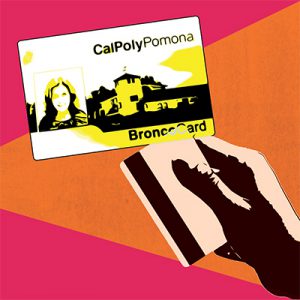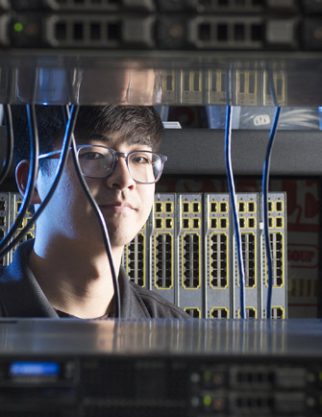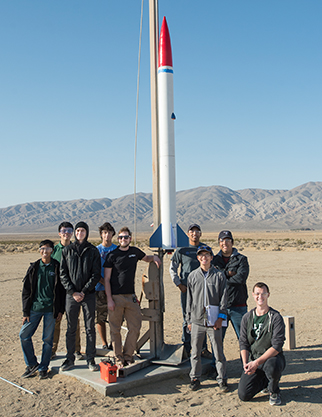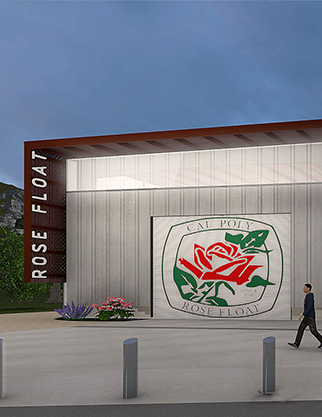Broncos Care
Eulexus Thomas was couch surfing in Long Beach and using public transportation to get to Cal Poly Pomona and her internship in Irvine. When California implemented shelter-in-place orders to prevent the spread of COVID-19, Thomas needed a better living arrangement to keep herself and others safe.
 The chemistry student received the required assistance, thanks to the Broncos Care Basic Needs Program, which provides support and resources for housing, food and financial needs. She applied for loans and an emergency grant that helped her secure an apartment near campus.
The chemistry student received the required assistance, thanks to the Broncos Care Basic Needs Program, which provides support and resources for housing, food and financial needs. She applied for loans and an emergency grant that helped her secure an apartment near campus.
“Now, I am more focused on school, and the environment that I’m living in is a lot more stable,” Thomas says. “I am more comfortable than I would have been if I didn’t have the basic needs assistance.”
 Safer at Home
Safer at Home
Cal Poly Pomona formed the Basic Needs Initiative in 2017 to support student well-being and allow them to focus on their academic success. A 2019 California State University (CSU) survey revealed that 34.4 percent of CSU students faced food insecurity and 3.7 percent reported being homeless.
After shelter-in-place orders were issued, many students lost their part-time jobs, looked for a safe home to live in and relied on the university to support their essential needs. Since mid-March, more than 1,000 students have received more than $450,000 in emergency grants, which primarily came from external donations.
Thomas’ housing and food insecurities started soon after high school when her mother lost her job and asked Thomas to work and support the family. Her mother gave Thomas an ultimatum: quit school or leave the house.
Thomas believed that an education would provide her with a better future and wanted to be in a safer environment, so she left. While she attended Long Beach City College, she moved from place to place, often taking the initiative to leave when she felt she was overstaying her welcome.

Eulexus Thomas
“I had no guidance and nowhere to turn to. I started going to school and was figuring out what I was passionate about but struggled with meeting basic necessities,” Thomas says. “I didn’t have meals every day or a stable place to stay, and it was difficult to stay focused on my academics when all these things were weighing on me.”
Once she decided to transfer to Cal Poly Pomona, Thomas reached out to Judy Juarez, the university’s care services coordinator, and received assistance with loans and grants, meal cards for food and hot meals on campus, and a campus wellness coach to help her create a plan to reach her academic and career goals.
After her internship in Irvine ended, she found a new position through the campus’ career portal, Handshake, and creates product reviews for the beauty marketing app GIST.
“I knew I was struggling, but I didn’t give up on school because it helped me cope with my personal life, and I feel like my education is paying off,” Thomas says. “Judy has a big heart and ensured that I had the resources I needed.”
If you are in need of housing, food or financial support, apply for assistance and speak with a care service coordinator to ensure your most urgent needs are met. Check with your colleges to see if they offer emergency grants in addition to resources provided by the Broncos Care Program.
 Stronger Together
Stronger Together
Colleges, alumni and donors have recognized students’ urgent need for support during the COVID-19 pandemic and have generously supported university and college emergency funds. Lea Dopson, dean of The Collins College of Hospitality Management, asked the board of advisors to support the emergency fund, and members gave $60,000 in emergency aid. Since March, 312 Collins students have received emergency stipends totaling $142,850.
Board members understood the impacts of COVID-19 across business industries, especially seeing the drop in operations in their own companies. They knew that students had either lost their jobs, had their work hours reduced, or had fewer internship and employment opportunities.
“I’m honored to be working with students at Cal Poly Pomona,” says board of advisors chair Cary Wheeland, senior vice president for Bon Appétit. “The future of hospitality will rebound with a new normal, and this younger generation is going to help define what that’s going to look like. That’s why I’m excited to be involved at Collins College with students who look toward the future, because as a result of COVID-19, we’re going to have opportunities to do new and unique work.”
For Michael Sencer, senior vice president of Hidden Villa Ranch, the recent COVID-19 pandemic is a familiar scene.
In 2014, the avian flu outbreak caused the California egg industry to change its sanitation standards to prevent the spread of the disease. Now, there are enhanced biosecurity measures in place to ensure the safety of poultry units. Sencer predicts that in a similar way, the world will be different after COVID-19.
“These last few months have been a nightmare for all of us,” Sencer says. “It will be over — it may not seem like it today and sheltering in place for three months has probably been boring, but it will get better. We will see improvements, but it won’t be entirely the same.”
Knowing that students are facing increased financial challenges, he and his wife Jakki provided $5,000 to the Don B. Huntley College of Agriculture’s student emergency fund.

Michael Sencer
“All of us at home know that many of these students can barely make it daily — we were there once,” he says. “We helped with what little we could give, and hopefully it will make a difference for a few students.”
Michael was 19 years old when he married Jakki, and the couple worked full-time to support themselves through college. During the last two years of his undergraduate years at Cal State LA, Michael worked in Jakki’s aunt’s egg business, and he’s continued in the industry for nearly 50 years.
Years later, Michael connected with Cal Poly Pomona through the California Agriculture Leadership Program, a partnership with four universities that trains agriculture professionals. He was one of the first community members to join and serve on the Huntley College’s Dean’s Council. He continues to support the college’s poultry initiative, annual Farm to Table Dinner and Pumpkin Festival.
“I learned very quickly how important agriculture is, and through Cal Poly Pomona with their ‘learn-by-experience’ environment, it was the perfect place to contribute my time,” Sencer says.
 Meeting Needs
Meeting Needs
Thanks to generous donors over the years, the emergency grants and additional support services offered through the Broncos Care Program have provided tangible relief to hundreds of students since 2017, allowing them to earn their degree and fulfill their career goals.
“We are grateful to the immense community support that will directly help our students during this challenging time,” says Krista Spangler, director of development for student affairs. “Your continued support will ensure that we can maximize the assistance we can provide to our students for their most urgent needs.”
The Broncos Care Program encourages the community to provide gifts to support our most vulnerable students, especially now at a time of uncertainty. Donors gave $58,078 to the program during Giving Day, an annual 36-hour fundraising campaign held in April, which will support an additional 116 grant recipients.
 “If donors are willing to continue to donate to the Broncos Care Program, it will benefit other people like me to continue my journey and graduate from Cal Poly Pomona,” says Thomas, who plans to graduate in 2021 with a chemistry degree and hopes to open her own dermatology clinic.
“If donors are willing to continue to donate to the Broncos Care Program, it will benefit other people like me to continue my journey and graduate from Cal Poly Pomona,” says Thomas, who plans to graduate in 2021 with a chemistry degree and hopes to open her own dermatology clinic.
Give to our Broncos Care Program to ensure that our students will receive support for their essential needs the moment they need it. Prolonged shelter-in-place mandates creates an uncertain environment for financial security and more students are being impacted by housing, food and financial constraints. Contact Krista Spangler at klspangler@cpp.edu or 909-869-4450 for more information on how you can help.











